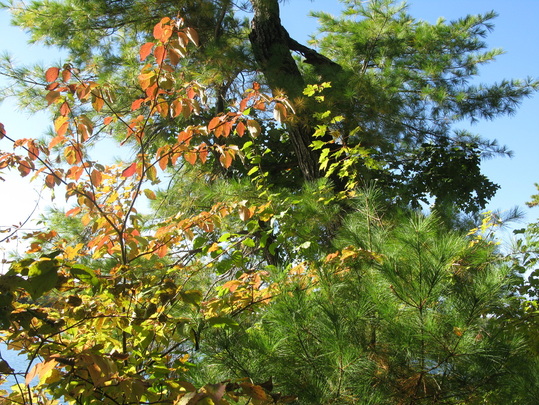Photo by Bill Youngs
But love of the natural landscape was not always present in American history. The first pioneers viewed forests in terms of board feet of lumber, wolves and bears as pests, and the Grand Canyon as an unfortunate obstacle to travel through the Southwest. Before a movement for wilderness preservation could grow, some Americans needed to celebrate forests, wildlife, and geological features for their own sake -- and needed to realize that "progress" threatened these natural wonders. Some of the forerunners of the explicit wilderness preservation movement of the late nineteenth century, began with subdued language, with laments that were all the more powerful for their expressions of personal sorrow at assaults on the natural world.
One such lament was written at mid-century in the journal of Henry David Thoreau. In this post, I will experiment with a two-part lesson. First let's see what Thoreau has to say. And then through the use of one of my favorite learning-aids, a "Quizlet," we'll review his little essay with a set of five flash cards designed to bring out the main points in his journal entry.
Here's Henry David Thoreau's account of the felling of a single pine tree:
Tuesday, Dec 30th, 1851
This afternoon being on fair Haven Hill I heard the sound of a saw-and soon after from the cliff saw two men sawing down a noble pine beneath about 40 rods off. I resolved to watch it till it fell-the last of a dozen or more which were left when the forest was cut and for 15 years have waved in solitary majesty over the sproutland. I saw them like beavers or insects gnawing at the trunk of this noble tree, the diminutive mannikins with their crosscut saw which could scarcely span it. It towered up a hundred feet as I afterward found by measurement-one of the tallest probably now in the township & straight as an arrow, but slanting a little toward the hill side. -its top seen against the frozen river & the hills of Conantum. I watch closely to see when it begins to move. Now the sawers stop-and with an axe open it a little on the side toward which it leans that it may break the faster. And now their saw goes again- Now surely it is going-it is inclined one quarter of the quadrant, and breathless I expect its crashing fall- But no I was mistaken it has not moved an inch, it stands at the same angle as at first. It is 15 minutes yet to its fall. Still its branches wave in the wind as if it were destined to stand for a century, and the wind soughs through its needles as of yore; it is still a forest tree-the most majestic tree that waves over Musketaquid. - The silvery sheen of the sunlight is reflected from its needles-it still affords an inaccessible crotch for the squirrel's nest-not a lichen has forsaken its mastlike stem- -its raking mast-the hill is the hull. Now's the moment-the mannikins at its base are fleeing from their crime-they have dropped the guilty saw & axe. How slowly & majestically it starts-as if it were only swayed by a summer breeze and would return without a sigh to its location in the air-& now it fans the hill side with its fall and it lies down to its bed in the valley from which it is never to rise, as softly as a feather, folding its green mantle about it like a warrior-as if tired of standing it embraced the earth with silent joy. - returning its elements to the dust again-but hark! there you only saw-but did not hear- There now comes up a deafening crash to these rocks-advertising you that even trees do not die without a groan. It rushes to embrace the earth, & mingle its elements with the dust. And now all is still once more & forever both to eye & ear.
I went down and measured it. It was about 4 feet in diameter where it was sawed-about 100 feet long. Before I had reached it-the axe-men had already half divested it of its branches. Its gracefully spreading top was a perfect wreck on the hill side as if it had been made of glass-& the tender cones of one years growth upon its summit appealed in vain & too late to the mercy of the chopper. Already he has measured it with his axe-and marked out the mill logs it will make. And the space it occupied in upper air is vacant for the next 2 centuries. It is lumber He has laid waste the air. When the fish hawk in the spring revisits the banks of the Musketaquid, he will circle in vain to find his accustomed perch. - & the henhawk will mourn for the pines lofty enough to protect her brood. A plant which it has taken two centuries to perfect rising by slow stages into the heavens-has this afternoon ceased to exist. Its sapling top had expanded to this January thaw as the forerunner of summers to come. Why does not the village bell sound a knell. I hear no knell tolled-I see no procession of mourners in the streets--or the woodland aisles- The squirrel has leapt to another tree--the hawk has circled further off-& has now settled upon a new eyre but the woodman is preparing to lay his axe at the root of that also.
(You know you want to!)
If you enjoyed this post, you may also enjoy these previous posts:
-- Swimmers at Walden Pond: Henry David Thoreau and his Successors
-- Would Henry David Thoreau have "Scored" an iPhone 5s?
For a wonderful presentation on the white pines of Minnesota, past and present, visit the
White Pines Society at the Wildlife Research Institute (Ely, Minnesota).


 RSS Feed
RSS Feed